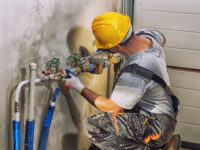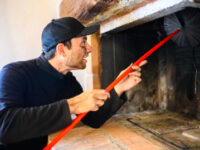What Is Commercial Plumbing?
Commercial plumbing involves installing, repairing, and maintaining water systems in more significant buildings such as offices, shopping malls, and restaurants. These systems ensure a reliable supply of clean water and proper wastewater management.
More significant buildings require extensive plumbing systems and are more likely to experience problems due to higher usage and potential wear and tear. Learn more about the differences between residential and commercial plumbing. Visit Website to learn more.
Plumbing systems in large commercial buildings have to deal with a lot more water usage than residential ones. That also means that these systems are far more complex and have to be more regularly maintained in order to function properly. This is because larger buildings have many more outlets and fixtures than residential homes. It’s not uncommon to find hundreds of toilets, sinks, drinking fountains, urinals, and other plumbing fixtures in a single commercial space, and all of them need to be kept in working condition.
Aside from having more outlets and fixtures, commercial spaces also have higher water pressure demands. They need to be able to keep up with a greater volume of people using the bathrooms, drinking fountains, and other fixtures every day. This is why it’s important to have the right type of pipes and other infrastructure for a commercial property in order to prevent problems like water leaks and low water pressure.
Unlike residential plumbing, which is limited to keeping up with the water needs of a single household, commercial plumbing deals with intricate systems in multiple-story buildings guided by strict regulations. This could include building codes on sewage disposal, backflow prevention, ventilation requirements, and more.
Plumbing issues in commercial buildings aren’t just more frequent, but they’re often more serious. Leaks, for example, can lead to massive flooding and water damage if not addressed quickly and efficiently. Plus, they can leave behind unsightly stains and mold growth that can affect the health and safety of everyone in the property. This is why it’s important for commercial plumbing to have a proactive approach with regular maintenance and inspections. This will help catch problems before they become costly disasters.
Multiple Buildings
Commercial plumbing systems often require more components and more complex functions than residential ones. For example, restaurants and shopping malls may need extra fixtures for soda machines or fire sprinklers. Additionally, a business that conducts toxic waste disposal will likely need its own separate system of pipes and fixtures to handle those materials. Moreover, the pipes in a commercial building need to be much larger to deal with the volume of water they will be carrying.
Larger buildings also have to take into account the role of gravity and how it affects water pressure. Many commercial plumbing systems use a main line that extends throughout multiple floors, with smaller lines branching off to each room. These lines must be able to carry a high volume of water while maintaining a consistent level of pressure.
In addition, some types of fixtures and pipes in commercial buildings need to be made of more durable materials than those found in homes. For instance, the sanitary drainage system usually requires pipes that go up to the roof vertically to vent gases. These pipes can be made of metals that are resistant to high temperatures or plastics.
Finally, some parts of a commercial plumbing system must be hidden out of sight. For example, a company’s kitchen might have grease traps to remove fats and oils from the drains. These traps must be placed where they can’t be seen, but must still be able to function properly.
All of this adds up to a more complicated system that’s more likely to experience problems than a residential plumbing system. However, a reliable IFM provider can help to minimize these problems by establishing routine maintenance services and ensuring that the right plumber is called when there’s an emergency.
More People
There’s a lot more people using the plumbing systems in a commercial building than there are in a residential house. This increased usage means that the pipes and fixtures are under a lot more stress, and they’re likely to wear out faster as a result. This is why it’s important for commercial plumbers to be available round-the-clock, so that they can fix problems as soon as possible.
The extra usage also means that there are more opportunities for things like clogged drains and toilets to occur. This is because more waste is being put down the drains, and it’s often not being properly disposed of. It can be a major headache for commercial plumbers to deal with, but it’s something that they must be prepared to do on a regular basis.
Many of the same strategies that can help residential plumbers grow their businesses will also work for commercial plumbing contractors. For example, developing a professional website, utilizing SEO, creating valuable content, and collecting customer reviews can all help to attract new customers to a business.
Another strategy that can be used by commercial plumbing companies is to join local social media groups in their area. By doing so, they can provide useful information and tips to local members of the community. This can lead to more referrals, which in turn leads to more business for a company.
Offering 24/7 emergency services can also help a commercial plumbing company to attract more clients. This is because it shows that a company is willing to go above and beyond for its customers, which can lead to more loyalty and trust. Additionally, being able to respond to plumbing issues quickly can mean that a company is able to avoid costly repairs and damages.
Higher Standards
The higher usage of commercial plumbing systems requires them to be built with robust pipes and fixtures that can stand up to greater amounts of pressure. They must also adhere to stricter health care laws and be designed with adequate water pressure to keep toilets and sinks flowing properly.
While residential plumbing is typically straightforward and can be done by a skilled DIY, commercial plumbing services are much more complicated. Commercial plumbing deals with larger, more interconnected water systems and often involves more complex equipment like boilers and fire systems. It is also often regulated by local codes and guidelines that require specialized knowledge to understand and comply with.
Commercial plumbers must undergo rigorous training and apprenticeship programs to master their craft. These programs last up to 4-5 years and combine classroom instruction with hands-on training in real-world scenarios. They must also successfully complete exams to receive their licenses and prove their mastery of the trade.
Additionally, commercial plumbing services must use specialized tools and equipment to tackle more complex jobs. These include high-pressure water jets, video inspection and surveying equipment, and other advanced technologies. They must also understand the importance of proper planning and record-keeping to ensure quality construction that complies with regulations.
When something goes wrong with a commercial plumbing system, it can have a much wider impact than a similar issue in a residential setting. Leaking taps or inefficient water heaters can cause major disruptions in businesses and may even lead to costly damage if left unchecked. It is crucial to have a reliable commercial plumber on-hand to handle any issues that arise. This way, companies can avoid losing revenue and customers due to unnecessary delays or costly repairs.
Long-Term Needs
While it’s easy to equate plumbing with things like working toilets and hot water, commercial spaces have much more in store for them. They need a complex network of pipes that are able to support high-volume usage and extreme temperatures. They also have requirements for specialized systems, such as fire suppression and special ventilation requirements.
A commercial property’s plumbing system is a vital part of its operations and needs to be maintained regularly to prevent problems. These issues can affect everything from employee productivity and customer satisfaction to the building’s overall value.
Leaks, for example, can have serious consequences in a commercial space, and even small leaks can cause structural damage. In addition, if water is allowed to sit in a wall or floor, it can deteriorate over time and cause mold. It’s important for commercial property owners to maintain regular inspections by a qualified plumber to detect and repair any problems before they become major issues.
The complexity of a commercial plumbing system also means that it can be more challenging to troubleshoot and fix. Many plumbers will use a combination of traditional methods and advanced technology to assess and diagnose a problem. This often involves sending cameras down drains to see what is causing them to stop working properly.
With a dedicated field operations management software, commercial plumbing businesses can improve their productivity and deliver better service to customers. This can lead to greater client satisfaction, repeat business, referrals and more. Contact us today to learn how our system can help your plumbing company grow and succeed.






